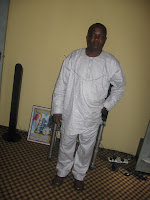Interesting & Fun Facts About Nigeria Nigeria is officially named the Federal Republic of Nigeria.
The country was named "Nigeria" after the River Niger.
Niger River is Africa's third largest river.
English is the main language of Nigeria. Apart from that, over three hundred languages are spoken in the country.
Nigerian Naira is the official currency of Nigeria.
The Federal Republic of Nigeria is a member of the Commonwealth.
The highest point in the Federal Republic of Niger is Chappal Waddi (2,419 m).
The main religions in Nigeria are Islam, Christianity, Yoruba Orisha or Orisa veneration and Ifá.
Apart from being a regional power, Nigeria is also listed amongst the "Next Eleven" economies.
Nigeria has one of the fastest growing economies in the world, with the International Monetary Fund projecting a growth of 9% in 2008 and 8.3% in 2009.
Archaeological evidence shows that human existence in Nigeria has a history which starts from 9000 BC. The Nok civilization (around 500 BC-200 AD) is the earliest known civilization here.
Portuguese were the first Europeans to reach Nigeria (1472).
Nigeria is the most populous country in Africa and the eighth most populous country in the world.
Oil was discovered in Nigeria in 1956, at Oloibiri (Bayelsa State).
Port Harcourt, on the Niger Delta, is the center of Nigeria's oil industry.
Nigeria is a member of the Organization of Petroleum Exporting Countries (OPEC), with petroleum accounting for 95 percent of its export income.
Nigeria is the 12th largest producer of petroleum in the world and the 8th largest petroleum exporter.
Nigeria has the 10th largest proven reserves of petroleum, in the world.
Nigeria has been ruled by military for most of the 47 years of its independence from Britain.
The main rivers of Nigeria are the Niger and the Benue, which meet and empty into the Niger Delta, one of the largest river deltas in the world.
Football is Nigeria's national sport.
Nigeria is an important centre for biodiversity.
It is widely believed that the areas surrounding Calabar, Cross River State, contain the world's largest diversity of butterflies.
The drill monkey is only found in the wild in Southeast Nigeria and neighboring Cameroon.
Nigeria has the second largest newspaper market in Africa (after Egypt), with an estimated circulation of several million copies daily (2003).
Nigeria has the highest rate of twin births in the world, compared to any other country.



